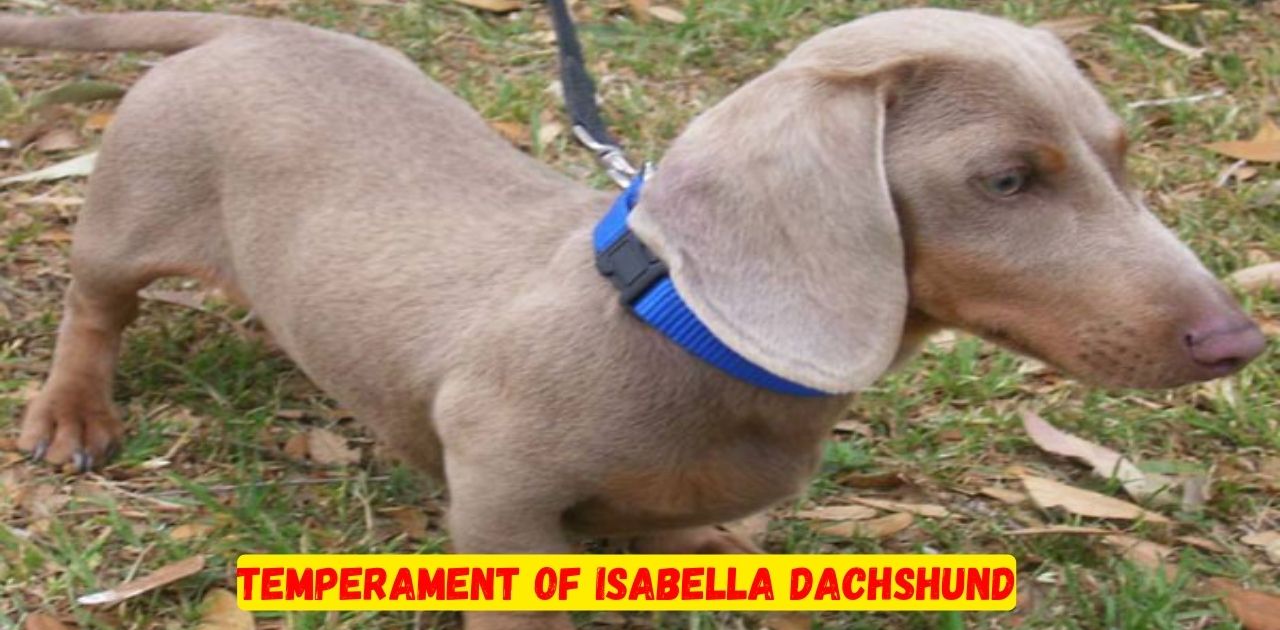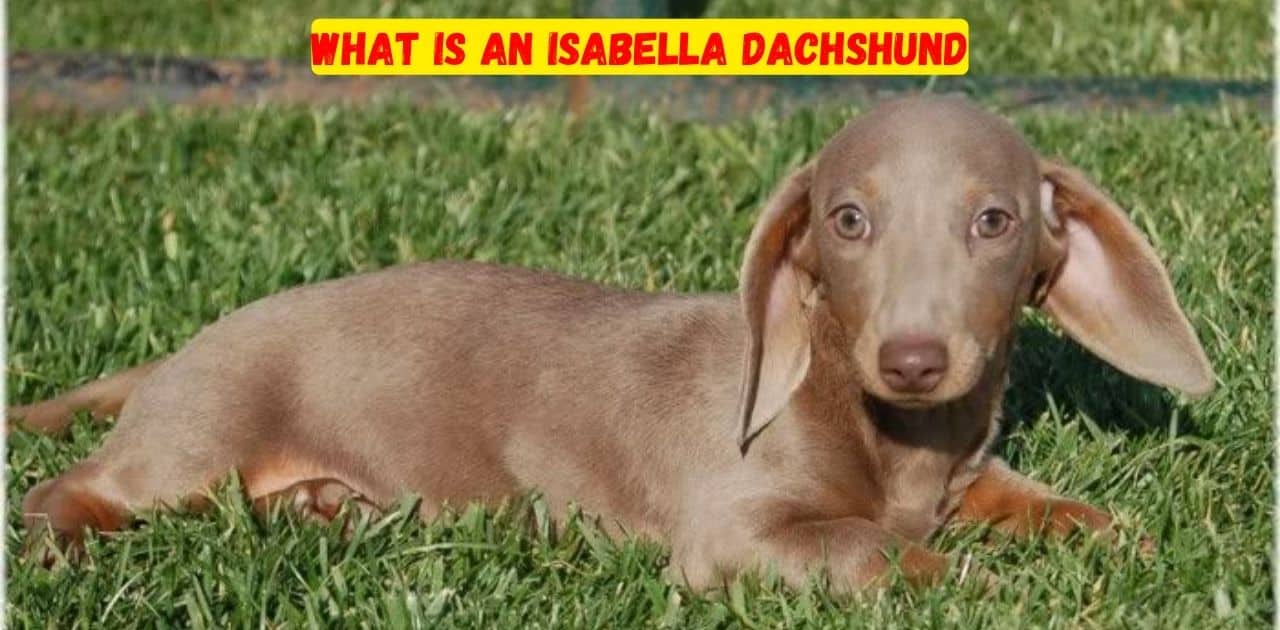The Dachshund is a little type of canine that began in Germany. Their most distinctive feature is their elongated body and short legs. Dachshunds were bred to hunt badgers and other small prey. Their long, low bodies allowed them to enter burrows to flush out animals. Dachshunds come in three coat varieties – smooth, wirehaired, and longhaired.
They are intelligent dogs with a brave, lively temperament. Though small, Dachshunds make excellent watchdogs. With proper training and socialization, Dachshunds can make great family pets.Their little size makes them ideal for loft living. Regular exercise is important to keep a Dachshund healthy and prevent obesity.
What Does An Isabella Dachshund Look Like?
The Isabella Dachshund has a unique coat color. Their fur is a solid dilute of the red coloring commonly seen in Dachshunds. This results in a pale, fawn or cream hue. The Isabella coat can range from a light beige to a warm brown.
Their fur is usually darkest along the spine. Isabella Dachshunds have almond shaped eyes that can be light amber, green or blue in color. Their long, narrow muzzles lead to a black nose. Their floppy ears frame their sweet faces. The Isabella coat appears in all three Dachshund varieties – smooth haired, long haired and wire haired. Despite their unusual fur, they have the characteristic long, low body shape of a Dachshund.
How Are They Bred?
The Isabella Dachshund is the result of selective breeding. They are bred from traditional red Dachshunds that carry a recessive dilution gene. When two Dachshunds carrying this gene are bred together, there is a chance they will produce Isabella puppies. The gene causes the normal red pigment to dilute to a lighter fawn or cream color. Reputable Dachshund breeders select parent dogs carefully through genetic testing.
This helps ensure they do not pass on unwanted diseases or traits. Responsible breeding also maintains the Dachshund’s classic proportions, small size, and lively temperament. While rare, the striking Isabella coat continues to fascinate Dachshund devotees. Diligent breeding preserves this unique variety for future generations to enjoy.
Should get an Isabella Dachshund
The Isabella Dachshund can make a wonderful pet for the right owner. Their small size makes them suited to apartment living. Dachshunds are bright and energetic dogs that need daily exercise and playtime. Their hunting background means they will eagerly partake in games of fetch. Dachshunds are also prone to stubbornness and barking, so training is a must.
Their long backs make them prone to spinal issues, so activities like jumping on furniture should be avoided. Since the Isabella coat is rare, adoption may be difficult. Buying from a responsible breeder ensures healthy puppies. While the upfront cost is higher, a reputable breeder screens for health and temperament. With proper care, exercise, training and socialization, the loyal Isabella Dachshund can be a delightful, devoted companion.
What Health Problems Do They Have?
The Isabella Dachshund is prone to the same health issues that affect the breed in general. Their elongated spines make them prone to back problems and intervertebral disc disease. Isabellas can also develop hip dysplasia, especially if allowed to become overweight. Patellar luxation, a dislocated kneecap, is another common concern.
Reputable breeders screen parent dogs for these conditions to reduce risk. As with any Dachshund, Isabellas should undergo regular veterinary checkups, maintain a healthy weight, and avoid high-impact activities like jumping. With proper preventative care and early treatment, many Isabellas can enjoy relatively good health well into their senior years. Working with a responsible breeder is key to getting a healthy puppy.
1. Alopecia
Alopecia is a condition that can affect Isabella Dachshunds. It causes partial or complete hair loss on the body. The exact cause is unknown but may be related to their dilute coat color genetics. The hair loss is typically symmetrical, appearing on both sides of the body. It most often develops at a young age though can occur later in life.
Alopecia is not painful and does not impact overall health. Treatment options include medications and supplements to encourage hair regrowth. Sun protection is important for hairless areas. While alopecia affects appearance, it should not impact an Isabella Dachshund’s wonderful personality. With proper management, alopecia can be a mostly cosmetic condition.
2. Cancer
Cancer is a health concern that can affect Isabella Dachshunds. They are prone to developing mast cell tumors, a type of skin cancer. The actual cause is unknown but may be more common in certain coat colors. Tumors often appear as raised lumps on the skin. They can be small or grow quite large. Early detection and removal is key to treat mast cell tumors.
In addition to skin cancer, Isabellas are at risk for other internal cancers later in life such as lymphoma. Catching cancer early and following veterinary recommended treatments like surgery, chemotherapy, or radiation can help extend an Isabella’s life. Working with a reputable breeder helps screen for hereditary cancers.
How Big is an Isabella Dachshund?
The Isabella Dachshund is a small breed, though size standards can vary slightly based on country breed clubs. In general, Isabellas typically stand 5 to 9 inches tall at the shoulder. Their narrow chest has a chest circumference of 8 to 11 inches. Isabella bodies are long, measuring 7 to 12 inches from forechest to hindquarter.
Yet they are compact at under 11 pounds for miniature Isabellas and 16 to 32 pounds for standards. Females tend to be slightly smaller. Despite their small stature, Isabellas have big personalities! Their elongated body shape gives them a uniquely long and low silhouette compared to other breeds. But their petite size makes them an ideal house dog.
Coat
The Isabella Dachshund is best known for its distinctive dilute coat. While most Dachshunds have rich red fur, the Isabella’s hair shafts lack full pigment. This dilutes the red to a light fawn, beige, or pale brown. The coat is a solid color over the entire body. It can range from creamy white to warm light brown. Sometimes the hair along the spine is a darker hue. Isabella Dachshunds have short, dense, shiny fur in the smooth coat variety. Longhaired Isabellas have longer fur with feathery tufts. Wirehaired Isabellas have a dense, rough coat. Despite the coat type, the trademark Isabella dilution is visible. This striking yet soft color is what defines this rare variety.
Temperament of Isabella Dachshund

The Isabella Dachshund has a spirited and lively temperament. Originally bred to hunt badgers and other prey, they are active and curious dogs. Isabellas are very intelligent and can be trained well with positive reinforcement. However, their independent thinking means they can be stubborn at times. Dachshunds are known to bark frequently which requires training to control.
Isabellas thrive on being with people and do not do well left alone for long periods.They can be careful about outsiders however are dedicated to their families.. With proper socialization and handling from a young age, Isabellas make loyal and affectionate companion dogs. Their small size belies their huge personality.
Isabella Dachshund and Families and .Other Pets Suitability
The Isabella Dachshund can make a great family dog when properly trained and socialized. Their small size and moderate exercise needs make them adaptable to apartment living. Isabellas love being with their people and enjoy playtime. However, young children should be taught how to gently handle these petite dogs. With early socialization, Isabellas can learn to get along well with other pets.
But sometimes they still retain their prey drive towards smaller animals. Isabellas can be possessive so supervision around toys or food is advised. They may not readily back down from confrontations. Overall, this loyal breed bonds deeply with all members of their family. With training, supervision, and respect for their small stature, Isabella Dachshunds can thrive in homes with kids and other pets.
Care and Maintenance of an Isabella Dachshund
Owning an Isabella Dachshund is a rewarding experience, but like any pet, they require proper care and attention. Here’s a look at their diet and exercise needs:
Diet Requirements:
- High-quality food: Isabella Dachshunds, like all dogs, need a balanced diet of high-quality food appropriate for their age, activity level, and health. Look for kibble or wet food specifically formulated for small breeds.
- Portion control: Dachshunds are prone to obesity, so it’s important to monitor their food intake and avoid overfeeding. Use a measuring cup to ensure they’re getting the right amount of food each day.
- Treats in moderation: Treats are a great way to bond with your dog and reinforce good behavior, but they should be given in moderation. Opt for healthy treats like fruits, vegetables, or small pieces of lean meat.
- Fresh water: Always ensure your Isabella Dachshund has access to clean, fresh water. A water bowl should be readily available, especially after meals and exercise.
Exercise Needs:
- Daily walks: Dachshunds, despite their short legs, are surprisingly energetic dogs. They need at least one to two walks per day, totaling 30-60 minutes of exercise.
- Indoor playtime: Walks are important, but don’t neglect playtime indoors. Engage your Dachshund in games of fetch, tug-of-war, or hide-and-seek to keep them mentally and physically stimulated.
- Beware of overexertion: Dachshunds have long backs that are prone to injury, so be careful not to overexert them, especially during walks or playtime.
- Joint health: Dachshunds are also susceptible to intervertebral disc disease (IVDD). To help prevent IVDD, avoid activities that involve jumping or excessive strain on their backs, such as climbing stairs or playing on high furniture.
Remember, every dog is an individual, and their needs may vary slightly. Consult your veterinarian to determine the best diet and exercise plan for your Isabella Dachshund. With proper care and attention, you can ensure your furry friend lives a long and healthy life.
Additional Tips:
- Dental care: Brushing your Dachshund’s teeth regularly is important for maintaining good oral health.
- Nail care: Trim your Dachshund’s nails regularly to prevent them from becoming overgrown and painful.
- Grooming: Brush your Dachshund’s coat regularly to remove loose hair and keep it healthy.
- Socialization: Socialize your Dachshund from a young age to help them get along with other dogs and people.
FAQ’s
What is the rarest Dachshund color?
The rarest Dachshund color is Isabella, a dilute version of red resulting in a light fawn or cream coat. Only breeding two recessive dilution gene carriers produces Isabellas.
What is the life expectancy of a Dachshund Isabella?
The average life expectancy of an Isabella Dachshund is 12-15 years. Providing proper veterinary care, nutrition, exercise and maintaining a healthy weight helps ensure a long life.
Do Isabella dogs have blue eyes?
Isabella Dachshunds can have light amber, green or blue eye colors. Blue eyes are less common but can occur in Isabellas along with dilute coat colors. Eye color does not affect health.
Is Isabella a colour?
Yes, Isabella is a rare coat color in Dachshunds. It is a dilute version of red caused by a recessive gene that results in pale fawn to cream fur.
Conclusion,
The Isabella Dachshund is a rare, special variety of this classic breed. Their distinctive appearance comes from a dilution gene that transforms the standard red coat into a distinctive light fawn, beige or cream. This unique coloring and their elongated, low-slung bodies give Isabellas an unmistakable look. Yet beneath their one-of-a-kind fur, Isabella Dachshunds have the same lively, clever personalities that have made Dachshunds beloved companions for centuries.
While rare, Isabellas make devoted family pets for those willing to give them the attention, training and care this active breed requires. With proper socialization, exercise and veterinary supervision, the bright and plucky Isabella can thrive in city apartments or country homes. Their small size belies big hearts. While their grooming and medical needs require dedication, Isabella owners are rewarded with a steadfast, cheerful companion. For the right owner, the singular Isabella Dachshund can be a loyal best friend.










